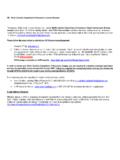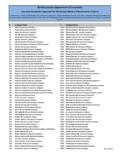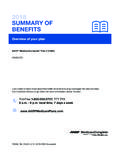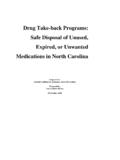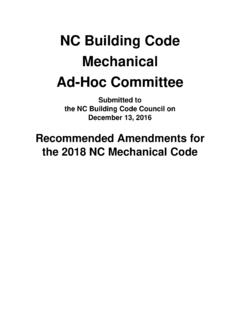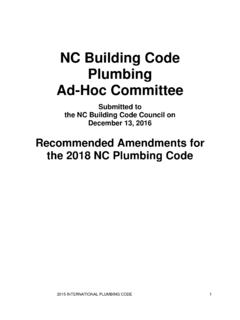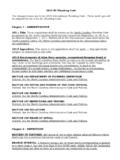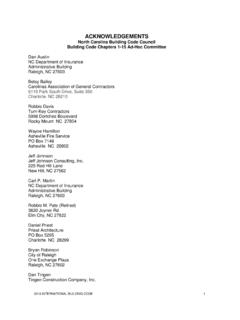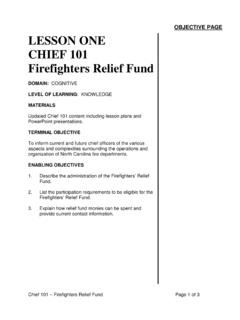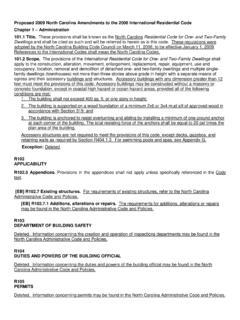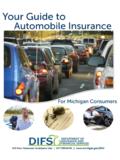Transcription of A CONSUMER’S GUIDE TO INSURANCE FOR YOUR …
1 A CONSUMER'S GUIDE TO. INSURANCE FOR. your BUSINESS. INTRODUCTION. INSURANCE consumers are urged to be cautious about the status of the company they are buying INSURANCE from. An INSURANCE company writing business in North Carolina can be either licensed or a nonadmitted insurer. A licensed company is subject to the Department's full regulatory authority: In most cases, when INSURANCE is purchased from licensed companies consumers are protected in the event of an insurer's bankruptcy. This protection is available to North Carolina residents through guaranty associations to the extent provided for in North Carolina laws. When INSURANCE is not available from a licensed insurer, a consumer may purchase INSURANCE through a licensed surplus lines broker which is written by a nonadmitted insurer that is not licensed but has been determined to be an eligible surplus lines insurer. The consumer should be aware that the Department has limited regulatory authority over eligible surplus lines insurers and that there is no guaranty association protection.
2 In these situations, the consumer should confirm the status of the INSURANCE company. Although only authorized companies or eligible surplus lines insurers may be engaged in the business of INSURANCE in this state, unauthorized activity does occur from time to time. If a consumer is uncertain about a company's status, please contact us at 855-408-1212 or check our web site at It is equally important that INSURANCE is purchased from a company that is financially sound. Financial ratings of companies can be obtained by visiting the public library and reviewing recent reports from rating agencies such as AM Best, Standard & Poor's, Moody's, Duff & Phelps, or Weiss Research. A. consumer can also visit our office and view the latest financial statements of any authorized company. The Department is prohibited from giving opinions about the financial condition of insurers. We will, however, provide basic financial data on any insurer to INSURANCE consumers. Finally, not all INSURANCE entities are the same.
3 INSURANCE purchased from certain entities may result in a subsequent assessment to the consumer because of poor performance by the entity. In these situations, the consumer may be jointly and severely liable in the event of the entity's bankruptcy. The consumer should ask about the business form of the company is it a non- assessable INSURANCE company or some other form of risk-bearing entity, and what the difference means to you. AGENT SERVICES. The Agent Services Division is designed to protect the general public of North Carolina by making sure the individuals representing the industry have an adequate knowledge of the industry and possess the moral and ethical characteristics necessary to operate in a fiduciary capacity. The Division's main function is to regulate all licensed agents, brokers, limited representatives, appraisers and adjusters authorized to do business in North Carolina. This includes all activities concerning licensing, appointing and educating agents, brokers, adjusters and limited representatives, both resident and non-resident, selling INSURANCE and adjusting claims of INSURANCE in North Carolina.
4 To learn if your agent is properly licensed, contact the Agent Services Division at 919-807-6800. IF YOU HAVE QUESTIONS, THE CONSUMER SERVICES DIVISION OF THE. DEPARTMENT OF INSURANCE IS HERE TO HELP. 855-408-1212 Toll free 919-807-6750 Outside of North Carolina 919-733-0085 Fax North Carolina Department of INSURANCE 1201 Mail Service Center Raleigh, NC 27699-1201. You can find additional information as well as a downloadable copy of our Request for Assistance form on the NCDOI Web site. NC Department of INSURANCE | Mike Causey, Commissioner | 1. INSURANCE FOR your BUSINESS. AUTOMOBILE. Virtually every business today needs a vehicle of some type: private passenger, van, bus or tractor trailer. A business needs to insure against damage to their own vehicles, injuries to third parties, damage to cargo and injuries to persons riding in their vehicles. The minimum limits are 30/60/25 and certain commercial auto limits are much higher. Rating of commercial auto policies is different from your personal auto.
5 There is no standardization of policies, rates or rating procedures. Most insurers will consider the driving history of all parties with regard to traffic safety and obeying traffic laws. Other factors include condition of vehicles, driver experience, driver training, driver supervision, hazards of the route, loading and unloading, motor vehicle records, use of non-owned vehicles and vehicle security. Many INSURANCE companies have safety programs that will often reduce your rates. Ask your agent for details. WORKERS COMPENSATION. Workers compensation and employers liability is a form of no-fault INSURANCE provided by the employer for the employee. The employee gives up certain rights to sue in exchange for protection from injuries incurred on the job. INSURANCE rates are developed by taking all losses from similar employers and aggregating them. There are approximately 600 classifications of employers in North Carolina and the classification your company falls under will effect the rates your business is eligible for.
6 Rates can and do vary from one INSURANCE company to another. INSURANCE companies would look at such issues as employee selection and training, first aid, medical evaluation, safety promotion, housekeeping and maintenance, material handling and protective clothing and equipment. Those businesses that employ three or more employees are required to carry workers compensation INSURANCE except agricultural employment with fewer than 10 employees, certain sawmill and logging operations and all domestic employees are exempt. 2. FIRE AND EXTENDED COVERAGE. Real and business personal property may need to be protected from physical loss. Such protection is normally acquired from a fire and extended coverage INSURANCE policy. There are two types of policies extending coverage: named peril or all risks. any specialty endorsements exist for different businesses. The type of construction, fire protection available, use of the premises, the likelihood of someone causing their own loss, contents, equipment (including electrical and mechanical) and emergency planning are important considerations from the INSURANCE companies standpoint.
7 BUSINESS INTERRUPTION. When a business is damaged from an insured peril, it suffers more than a physical loss to its property. Employees may not be able to work and may quit and go to work for a competitor. Customers shift to other sources. Income from operations is lost. Expenses for such things as taxes, INSURANCE , electricity, phone, debt service and contractual obligations may continue. To protect against financial loss, a business may wish to insure its income. GENERAL LIABILITY. Commercial general liability INSURANCE covers a wide range of liability exposures, generally grouped under premises and operations liability, products and completed operations liability, and liability for various intentional torts. There are currently two types of policy triggers which generate coverage: claims made and occurrence. Before purchasing general liability, be sure to understand the difference and how they operate. Policies provide a limit of coverage and some include the defense costs within those limits.
8 Other areas to consider are: duty to defend, aggregate limits, contractual liability, fire legal liability and pollution exposures. BONDS. Bonds resemble INSURANCE contracts in many ways, but they are sufficiently different to require special comments. Bonds differ from INSURANCE in that a bond expects no loss. A bond generally guarantees performance or that certain things will, or will not, be done. Unlike an INSURANCE policy, a bond has three parties involved: surety (generally an INSURANCE company), obligee (owner or entity that will benefit in the event of loss), and principal (this is the entity that needs the bond to guarantee 3. his work or performance). n the event that the surety ( INSURANCE company) has to pay a loss to the obligee, the surety will look to the principal to indemnify the surety. Some examples of bonds: contract, bid, performance, payment, and maintenance. EXCESS AND UMBRELLA. Excess and umbrella liability policies are but a few of the many terms used to describe the various coverage formats providing catastrophic loss protection when underlying INSURANCE is inadequate or lacking.
9 These are liability coverages that pick up when the underlying coverage has been exhausted due to a severe claim. They do not provide primary coverage. There is no industry standard and it is important that it match the business' general liability INSURANCE . These also have claims made and occurrence coverage triggers and it is important to understand these concepts. Policies will either provide a duty to defend or indemnity coverage. Duty to defend is a provision where the insurer has the right and duty to defend lawsuits against the insured, even when those suits are considered false, groundless or fraudulent. Indemnity coverage means the insured must pay up front and may be reimbursed. Concurrency means that the policy period of the excess or umbrella policy is the same as the underlying commercial general liability. These policies can contain deductibles known as "self insured retention" which amount must be paid by the insured prior to the policy coming into play.
10 FLOOD AND EARTHQUAKE. As a general rule, flood and earthquake coverages are not provided in standard property policies. Earthquake may be available as an additional coverage purchased from the property carrier. However, flood must be purchased as a separate policy from the National Flood INSURANCE Program, which is a Federal program. Further, flood can only be purchased if the county or city where the property is located is participating in the flood program. Coverages and rates are determined by the NF P. The NF P. may be reached at 800-427-4661. 4. INLAND MARINE. Inland marine policies are generally used to cover property that is mobile or in transit. t may also be used to insure such items as bridges and radio and TV antennas. Most policies cover physical loss although some may cover business interruption. Inland marine was the first line of INSURANCE to introduce the concept of "all risks" (now generally referred to as direct physical loss). Valuation of property insured may be by "actual cash value,".
